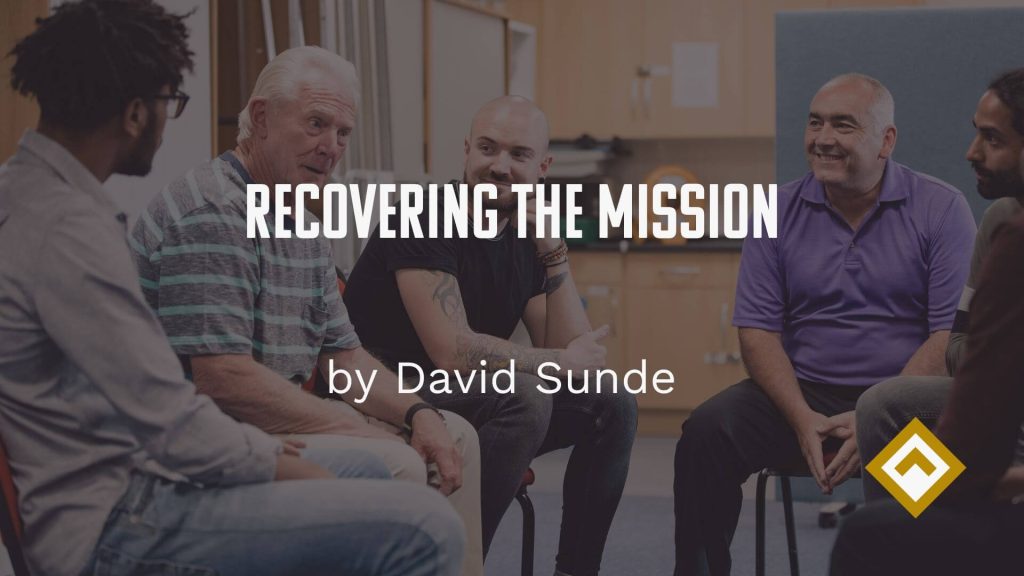
When my team and I set out to plant a church in the Pacific Northwest, we started with several months of prayer, planning, and training. Most people think that was our first step. But what most people don’t know is that for 2 years before our training and planning ever started, my wife and I spent most of our free time praying, enlisting prayer partners, and consuming every church planting resource that we could get our hands on.
I remember running across this one guy who called himself the “Church Planting Ninja.” And I’m really not sure if this was a quote from one of the books he wrote, or something he said on a podcast somewhere, but this is something he said that seven years later, I STILL can’t get out of my head:
“There’s a big difference between ‘Starting a church’ and ‘Planting a church.’ You can start a church with a chunk of money, a sexy logo, a cool website, a bunch of existing believers, bypass the hard work of evangelism and discipleship and still be ‘successful’ without ever seeing any Kingdom fruit…but that’s not what the Apostles did.”
“The Apostles didn’t start churches, they planted churches. And planting churches requires getting your hands dirty with the hard work of evangelism and discipleship.”
(Mr. Ninja, I’m sorry I butchered this quote…I’m just typing this from memory!)
So when we gathered the group of people that would become the core team for River City Church, I presented this idea to them and I asked them bluntly: “Are we more interested in starting a church, or do we want to actually get our hands dirty and plant a church?”
It was unanimous – nobody on our team was interested in bypassing the hard, dirty work of evangelism and discipleship. So together, we started praying about what it would look like to truly reach the people in our community that nobody else was reaching.
In the first chapter of the Gospel of John, we are introduced to one of the Apostles that doesn’t get a mention by the other Synoptic Gospels– Philip the Apostle (not the same guy as Philip the Evangelist, who we meet in the book of Acts). Philip had a friend who was on a journey to discover Truth; his name was Nathanael.
Here is our introduction to them both:
The next day Jesus decided to go to Galilee. He found Philip and said to him, “Come, follow me.” Philip was from Bethsaida, Andrew and Peter’s hometown. Philip went to look for Nathanael and told him, “We have found the very person Moses and the prophets wrote about! His name is Jesus, the son of Joseph from Nazareth.” John 1:43-45
All indications point to the fact that Philip and Nathanael were probably childhood friends– they grew up in the same neighborhood. I like to imagine Philip and Nathanael staying up late around the campfire as young kids, discussing their curiosity about the things that the prophets of old had written.
And now that Philip has finally encountered the One who had been prophesied about, his first instinct was to go and tell his curious friend about Who he had found!
Philip travels the 1.5 or so miles from Galilee to Bethsaida just to go find Nathanael, and to tell him about Jesus. And Nathanael’s reaction?
“Nazareth!” exclaimed Nathanael. “Can anything good come from Nazareth?” John 1:46a
Now…here’s where things get interesting. I know many people who, unlike Philip, would look up to heaven after this response, shrug and say, “I tried!” Philip would even have been justified in saying, “I did my part, I told my friend about Jesus, he said ‘no thank you,’ and now my conscience is clear!”
But that’s not what Philip does!
Even though Philip was faithful in telling Nathanael about Jesus, Philip’s testimony was not enough to convince Nathanael, because there was something else at play. Nathanael had some assumptions that were deeply ingrained into his way of thinking (probably by what he’d heard about Nazareth in the news).
But instead of moving on, Philip takes it a step further:
“Come and see for yourself,” Philip replied. John 1:46b
Now, I don’t want you to miss this. Instead of taking the easy way out, Philip chose to do the hard work of evangelism and actually journey together with Nathanael.
Philip had already told Nathanael about Jesus, but that wasn’t enough. Instead, Nathanael needed to experience Jesus for himself in order to believe.
And check out what happens when Nathanael is able to actually experience Jesus for himself (rather than rely on what he had heard about Jesus combined with the assumptions that had been ingrained into his way of thinking):
As they approached, Jesus said, “Now here is a genuine son of Israel—a man of complete integrity.” “How do you know about me?” Nathanael asked. Jesus replied, “I could see you under the fig tree before Philip found you.” Then Nathanael exclaimed, “Rabbi, you are the Son of God— the King of Israel!” John 1:47-49
When Philip takes the time and effort to actually journey together with Nathanael to get him to Jesus, Jesus does the work of wiping away all the presumptions that Nathanael had. Then Nathanael immediately chooses to believe and to start following Jesus!
Now…that’s a lot to unpack. So let’s jump straight to it, ninja style!
When working towards applying this passage while planting a church, a few questions come to my mind: “How can we find individuals who are curious about spiritual things?” And, “How am I going to get them to Jesus?”
Philip and Nathanael grew up together…but when I moved to a new city in order to do the hard work of evangelism and discipleship, the chances of somebody that I grew up with visiting my church plant were pretty slim.
Because we wanted to do this in an authentic way while avoiding any “bait & switch” tactics, we decided to do something bold on our guest connection cards: A short spiritual survey.

Because we are straightforward and honest with people about our intentions, we’ve found that more individuals are willing to be straightforward and honest about where they think they are. One metric that we follow and that we get really excited about is that we get an approximate 85% return rate on guest connection cards! And of the cards that are returned, approximately 25% of our guests indicate that they are “curious about spiritual things & trying to find some answers!”
This is really exciting for us to see, as this means that these individuals are actually open to a journey to discovering Truth. But I have to be honest with you and say that I was not prepared for that many people to circle “Curious!”
In order to be intentional about not skipping the hard and dirty work of evangelism, we had stumbled onto these truths:
It is important to try and find out where people are on their spiritual journey. If you honestly ask, many people will honestly tell you!
So this left us with the burning question: “What now?”
I found myself holding dozens of guest connection cards from people who indicated that they are “curious about spiritual things & trying to find some answers”! And not only that, but these cards also had names, phone numbers, email addresses…
We felt as if we had struck church planting gold!
So after spending more time in prayer, I set out to write the book Curious?: Everything you need to make an informed decision about Jesus. But in order for this book to achieve the results we were seeking, we knew that it had to be different from a typical book.
We wanted this to be relational! We want to journey together with our friends and neighbors who are curious.
Because of that, Curious? is intended to be read together, by a Jesus-follower and their curious friend(s). Just like a devotional, this book is separated into days instead of chapters. Each day is four pages long, and the idea is to meet after a week’s worth of reading in order to discuss thoughts on what has been read so far (regardless of if those thoughts are pro-Christian or not).
This entire journey is intended to last ten weeks. Every single day begins with Scripture (mostly from the Gospel of John), followed by a simple “cookies on the bottom shelf” explanation of the Scripture (because let’s face it…if you didn’t grow up in church, even the NLT can sometimes be hard to understand).
This opportunity to journey together with someone who is engaging with the Curious? book is my team’s attempt to do the hard, relational work of evangelism…because we feel that simply expecting the Sunday sermon to land in the right place in a curious person’s heart is the same as looking up to heaven, shrugging, and saying “we tried!”
And yes, we may have tried…but we live in a world where assumptions are deeply ingrained into many people’s way of thinking. So instead of us simply sharing our own testimony of how Jesus has changed our lives, maybe what our community needs is to actually experience Jesus for themselves!
So we take it a step further, and we actually journey together with them. We give them an opportunity to experience Jesus for themselves in a way that many never have– through His own words.
And what we find is that when people come face to face with the real Jesus (not the Jesus they’ve probably heard about in the news), that is when we see Jesus wipe away their presumptions!
I can’t tell you how exciting it is to watch dozens of guest connection cards marked “Curious” transform into dozens of new believers! And then, to watch as these new believers get excited to share about the Jesus they’ve just encountered with their curious friends!
Please allow me to end with this question: What are you more interested in doing – Are you more interested in starting a church with a stack of money, a sexy logo, a slick website, and a bunch of existing believers? Or do you want to actually get your hands dirty and plant a church?
If you answered this question the same way that we did, then I challenge you to think through this: How can you find individuals in your context who are curious about spiritual things? And how do you plan on getting them to Jesus?
Ryan Sidhom is the church planter and pastor of River City Church in Vancouver, Washington, where he leads a vibrant community dedicated to service, fellowship, and spiritual growth. With a vision inspired by the early church in Acts, Ryan has guided River City Church in becoming a hub for community support and engagement. Under his leadership, the church has initiated numerous service projects, including monthly days of service, hygiene facilities for the homeless, and extensive volunteer work totaling over 45,000 volunteer hours in just 5 years. Passionate about church planting, Ryan started Multiply Vancouver to support the goal of Gospel saturation in Vancouver, WA. He pioneered the “Metaverse Mission Trip” in 2022, and he is the author of Curious?: Everything you need to make an informed decision about Jesus, as well as Changed By Love: Living a Spirit-filled life in a self-centered world, two parts of a five-book series aimed at raising up future church planters. Ryan lives in Vancouver with his wife, Clarissa, and their two boys.
The post Engaging the Curious: Journeying Together to Jesus appeared first on Newbreed Training.








